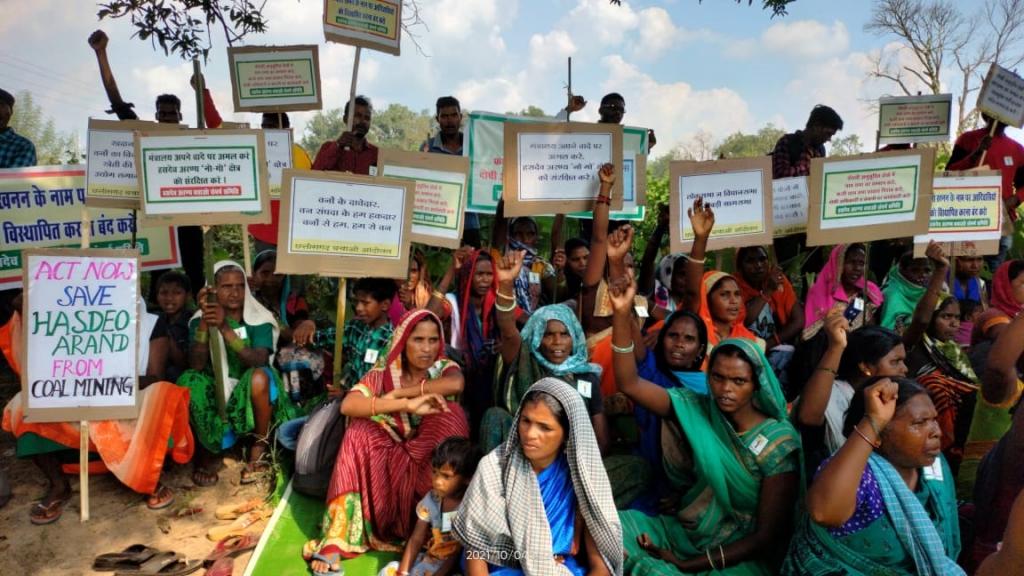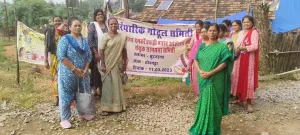Why Adivasis Of Hasdeo Aranya Are Back On The Streets, Again
Protests to protect one of India’s largest forested corridors has been ongoing for over the past one decade

“The jungle is my home. If we don’t keep up our fight to protect it, what will I save for our generations to come?” asked Sunita Porte, an Adivasi from Ghatbarra village of Surguja district as she prepared to march to Raipur to protest the rampant tree felling and mining activity in Chhattisgarh’s Hasdeo Aranya, India’s largest forest corridor.
Stretching over 1,500 km of central India and spanning the districts of Korba in the south and Surguja in the north, the area is home to Adivasis, including the vulnerable Gond and Oraon tribes. It is also the habitat for hundreds of elephants.
Five billion tonnes of coal lie beneath the Hasdeo forests, it is estimated. The contentious mining activity that has been going on in the region for over a decade now is the result of the dilution of environmental laws, as we explain later. Adivasis of Hasdeo Aranya have been protesting against the forceful acquisition of the forest lands without the consent of their Gram Sabhas. Activists allege that not only are the views of the community disregarded but their struggle is repressed as well.
On Sunday, January 7, thousands of Adivasis like Porte, concerned citizens and activists marched to Raipur to protest the mining activity in the region. Several of them were reportedly detained through the course of the protest and prior to it. Despite this, several turned up for the protests raising slogans such as “Adani go back, protect our forests”.
Women At The Forefront
Women like Porte have been the bulwark of this anti-mining campaign, as Behanbox reported in October 2021. This is because women pay a disproportionately high cost for displacement caused by mining, said Bipasha Paul, programme officer of Janabhivyakti, an NGO that works with the residents of Hasdeo Arand. She pointed out for instance that mining destroys and pollutes all available water sources forcing women to walk long distances for drinking water.
The Adivasi economy, largely dependent on forest produce, is run primarily by women. They rely heavily on the biodiversity of Hasdeo forests. They have an intergenerational knowledge of extracting benefits from different parts of trees and plants, including the roots.
Displacement leaves an entire community vulnerable but women experience it in disproportionate ways. Shakuntala Ekka, a resident of Kehti panchayat in the Hasdeo region recalls the plight of women after the PKEB coal block was cleared for mining in 2011.
“Having lost their land, livelihood and homes, women were forced to work as domestic help in other people’s homes. Many faced harassment. Their financial independence was taken away. They were left at the mercy of their husbands, many of whom spent the entire compensation money on alcohol,” she said, adding that they prefer their mud house in the forest to the box like houses they get in the rehabilitation process.
This gendered impact means that women have been at the forefront of the campaign, mobilising people. Ever since the combined Gram Sabha meeting and the protest march was announced, women of the villages started spreading awareness about the gravity of the situation and motivating people to join in large numbers,” Paul said.
Fight For Land, Resources, Home
At the heart of the current protests is the Parsa East Kente Basan (PEKB) block spread across the state’s Surguja district over 17.6 sq km and spanning four villages. It is owned by the state-run Rajasthan Rajya Vidyut Utpadan Nigam Limited.
The PEKB coal block was granted forest clearance in March 2012 for 15 years, and it exhausted its reserves seven years before the approved timeline and has applied for an amendment to the forest clearance granted to it by the environment ministry.
In February 2019, the Union environment ministry’s Forest Advisory Committee (FAC) gave Stage I clearance to the Parsa coal mining project citing fait accompli without referring to the project’s biodiversity impact assessment report. According to the FAC meeting minutes of July 26, 2018, the area where the Parsa coal mining project had been proposed “is sensitive from erosion point of view and vegetation density”. But, the report also pointed out that in the past a “similar case of PEKB and Tara Coal block in Hasdeo-Arand Coal was granted approval by the competent authority by overriding the recommendation of the then FAC”.
In 2020, nine sarpanches and a Janpad member of the Podi Uproda Panchayat in Korba district wrote to Prime Minister Narendra Modi urging that the auction of 16 coal blocks be put on hold. The letter stated that the Gram Sabhas had not consented to mining in the region.
The campaign is rooted in the previous experiences of tribal communities that have maintained that mining operations in Hasdeo Aranya, with 98% forested land spanning 170,000 hectares, will devastate their habitat, livelihoods and cultural identities.
“We are fighting for the rights of our forests and our lands and our resources,” Sunita Porte says. “Most importantly we want to protect our homes and our jungles for the generations to come. We do not want the money of the companies. We live in homes made of mud. We are connected to nature and we cannot go from here. We are folding our hands in front of the government to leave Hasdeo Aranya. If we give up our lands now we will not have any identity.”
Political Apathy
According to reports, 41 hectares of trees were felled in 2022, and the clearance for an additional 93 hectares was granted in November 2023. Both the Congress and the BJP have criticised each other over mining-related deforestation during their stint in the Opposition.
In the over two decades of its existence, the BJP led the Chhattisgarh state assembly for 15 years. But the Adivasis of Hasdeo say neither the BJP nor the Congress respects its political decisions.
Activists allege that immediately after the BJP’s win in the recent state election, the government focus has shifted to the re-initiation of the mining activity in the region after it was halted in the wake of protests as we detail later.
“The violation and the dilution of norms not just strengthens corporates but also weakens our democratic processes,” said Alok Shukla of the Chattisgarh Bachao Andolan that is focussed on the forest rights of the Adivasis. “Several activists, sarpanches and participants at the January 7 march were stopped from voicing dissent. The lack of recognition of the Gram Sabha’s opposition to mining activities and of Adivasi rights has compelled people to step out onto the streets time and time again.”
‘Violation At Every Stage’
The PKEB Project Was Cleared By The Chhattisgarh Government On March 22, 2022. A Fortnight Later, On April 6, The State Government Also Granted Final Approval To The Adjoining Parsa Coal Block Where Tree-Cutting Began On April 26. The Tree Felling Was Paused Only After Protests.
A Chhattisgarh Based Lawyer Participating In The Current Protests Explained The Multiple Policy Violations That Deforested The Region And Impacted Its Environment. Said Sudiep Srivastava: “The Projects Are Now Made Fait Accompli Without Any Suggestion Of Alternatives, That Is Just Because A Project Has Been Allotted It Must Be Given Clearance. Across India There Are Approximately 900 Coal Blocks Of Which Around 500 Have Not Been Allocated Yet. The Clearance Process Takes Off Without Determining Which Blocks Will Cause The Minimum Damage. This Is A Violation Of The Environmental Clearance Policy. The Entire Process Of Clearance Is A Sham.”
Designated A Special Zone
Hasdeo is a designated tribal majority area under the Fifth Schedule of the Constitution of India which delineates a separate legal and administrative framework for certain areas to safeguard the interests and rights of the Adivasi population. The Panchayats (Extension to the Scheduled Areas) (PESA) Act, 1996, and the Right To Fair Compensation And Transparency in Land Acquisition, Rehabilitation, and Resettlement Act, 2013,clearly state that the Gram Sabha or Panchayat should be consulted before land acquisition in tribal majority areas.
In 2010, Hasdeo Aranya was declared a no-go zone by the Ministry of Environment, Forest and Climate Change. The FAC advised against granting clearance to mining projects in the area on three occasions, in 2009, 2010 and 2011, on the grounds mining would destroy the dense forests that sustained a rich ecosystem inhabited by elephants, leopards and sloth bears.
In 2015, 20 Gram Sabhas unanimously passed a resolution against the auction of coal mines in the Hasdeo region citing violation of Forest Rights Act (FRA), 2006. The Act recognises the forest dwelling tribal communities’ and other traditional forest dwellers’ rights to forest resources.
We believe everyone deserves equal access to accurate news. Support from our readers enables us to keep our journalism open and free for everyone, all over the world.


